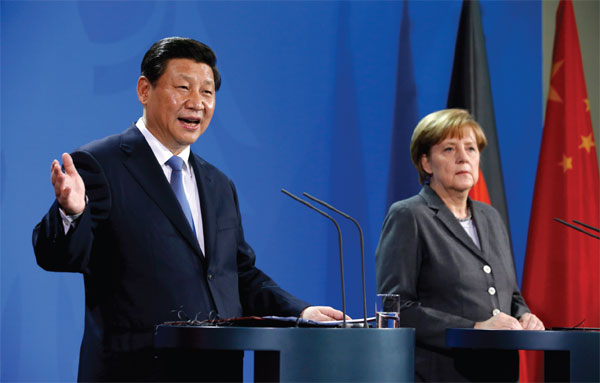Expectations from Merkel's 7th China trip
- By Liu Zuokui
 0 Comment(s)
0 Comment(s) Print
Print E-mail China.org.cn, July 5, 2014
E-mail China.org.cn, July 5, 2014
|
|
|
German Chancellor Angela Merkel (right) and Chinese President Xi Jinping address a joint news conference after an agreement signing at the Chancellery in Berlin on March 29, 2014. [Photo: China Daily] |
By the same token, Merkel has chosen Sichuan as her first stop in her upcoming China trip, since the southwest Chinese province hosts a handful of multinational German companies including Volkswagen and Siemens, and is also a hub in the Silk Road Economic Belt. All signs show that Merkel intends to seek a greater market share in China's western regions.
Second, new developments in bilateral ties include regional cooperation. Merkel said her administration would continue to explore local market potential in China; in her previous six visits in China, Merkel visited cities including Shanghai, Tianjin, Guangzhou, Xi'an and Nanjing.
Third, bilateral cooperation will focus on science and technology. Throughout more than 40 years of relations, bilateral cooperation in science and technology between China and Germany has expanded into various fields, and has a solid foundation.
Finally, China seeks to make the most of advanced German technology in pushing forward an "innovative partnership."
Germany is a world leader in new energies, electronics, environmental protection and other cutting edge technologies that China needs in shaping its "green economy" for sustainable growth. The two parties can focus on these fields in cementing an "innovative partnership."
Noticeably, China-Germany bilateral ties will not always be eventless. As China is a fast rising competitor which is capable of innovation, Germany's market opportunities in China may be transient.
High-speed railway technology is a case in point. Germany set up many barriers to prevent keen Chinese importers, forcing Chinese railway companies to develop their own technology, which later became successful.
It is expected that Merkel will carefully play Germany's technology card in dealing with her Chinese counterpart, in a common bid to ensure win-win results.
The author is an associate professor with and deputy head of the Department of Central and Eastern European Studies, Institute of European Studies, Chinese Academy of Social Sciences.
The article was written in Chinese and translated by Chen Boyuan.
Opinion articles reflect the views of their authors, not necessarily those of China.org.cn.







Go to Forum >>0 Comment(s)